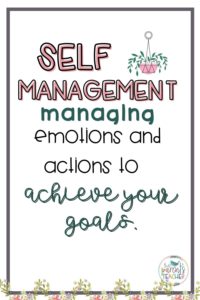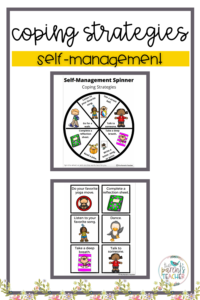Self-Management strategies were once taught to an exclusive bunch ‘who needed it most’. In reality, these skills are not created just for specific people. Everyone could benefit from learning self-management strategies. While it’s put in a negative connotation most of the time, it should not be. Kids are taught core subjects at school such as math, reading, and science. Social emotional learning skills also needs to be incorporated and practiced – with everyone – not only in monthly counselor sessions.
There are people acting out in rage and fear on the news almost every single day. Through the pandemic, an increased number of people are reporting that they find it harder to control their anxiety, anger, stress, etc. In turn, some people act out in ways that may harm themselves and others. At the basis, it’s important for people to know how to control their emotions positively. It is also important for people to know how to express emotions versus suppress them. In turn, people will learn how to cope with intense emotions in a healthy way. Self-regulation skills are becoming more popular buzz words to learn and practice with children at home and school.
Self-Management Defined
Self-management is defined as, “regulating emotions and actions to achieve your goals.” It is also many times referred to as self-control or self-regulation. In cases of immense anger or anxiety, children and adults practice and use positive coping skills to deal with these strong emotions. These self-management skills are important to learn, understand, and practice.
In the book, “Teaching Students with Special Needs” (Tom E.G. Smith), it’s stated, “a promising intervention strategy for children and adults with autism is self-management-implementing a variety of techniques that assist in self-control.” While this is still true, there is a new development. This learning is beneficial to any child and adult, not exclusive to people with intellectual disabilities.
For a child, self-management might look like controlling his emotions when someone or something outside of his control made him feel upset or angry. A student proficient in self-management skills may use a coping strategy to regulate his emotions.
Whether it be at home or school, all children need to explicitly learn and practice self-management skills and strategies. These skills are lifelong skills. This means they are significant and useful in the present and in the future as an adult. Regulating emotions help achieve small, short term goals, as well as big, long term goals.

Why Learning Self-Management Skills Is Important
We all get upset, or angry, or extreme excitement. Most of us learn what reactions are classified as appropriate and inappropriate to certain emotions. However, there are times even adults struggle and, without consciously being aware of it, they too turn to some strategies they learned along the way. We can make a tremendous impact if we explicitly teach children these skills early on.
An initial reaction of a child upset at his sibling might be to harm the other child physically or emotionally. A self-managed child on the other hand, may decide to walk away from the situation and count to 100 to calm down instead. This child used a coping strategy to positively deal with the situation.
Self-management skills build autonomy, where children can take ownership of themselves and their actions. They don’t need as much assistance controlling their emotions the next time they’re angry, but rather, they have strategies in place to help themselves (i.e. taking deep breaths, imagining a happy place, etc.). Self-management strategies are useful even in the workplace. These coping strategies are lifelong skills and help achieve goals. Self-management allows us to focus on the goal at hand and achieve our goals.
Coping Strategies
As adults, we may use self-management strategies without consciously being aware of what we are doing. When we have a stressful day at work, we may go for a walk. On the other hand, there are times we are more overwhelmed than usual. During this time, we may have trouble taking a moment to realize how we are feeling and therefore, not know how to cope and feel better. The emotion may last longer than we wish. It may not be until someone reminds us to take a moment, take a breath, and feel how we’re feeling that we think of a coping mechanism.
Likewise, children will face similar emotions and may not have a bucket full of strategies to use at hand. They may result into crying, throwing things, or turn to other negative coping mechanisms.
I had a student my first year of teaching who would go to the cooldown corner and write a rap song to describe his feelings. The following year, the principal and his new teacher implemented the same strategies to support this method. If he was not taught otherwise, the student would probably have continuously reacted negatively had we not learned about and discussed strategies to calm down. No matter if it is in the curriculum or not, it is essential to teach self-management strategies at school and home to support children with identifying positive coping strategies that work for them individually.
Some examples of self-management strategies may be; going for a walk when stressed, coloring when nervous, meditating when unclear, etc. No one strategy works for every emotion and for every person. It is an experimental process, and that is why it is so important to provide children with a tool box of self-management strategies to pull from. Not only will this skill help them now, but also as adults.
How to Teach Self-Management Skills
It is essential to teach self-management skills explicitly for some of the reasons stated above. So, how do you teach self-management skills?
There are a lot of at home and school activities for self-regulation. Step one is to make children aware of the term ‘self-management’ and ‘self-regulation’. Then, allow them to explore what this means to them. In my lesson plan, children will learn the meaning of this term, get some examples, and then experience a variety of self-regulation strategies to determine which works best for them. The concept is not ever over after teaching the week of specific lessons. Students will continue to experiment different strategies during various experiences they go through. Moving on after the school year, and even into adulthood, these lessons will better equip students to act positively even in unlikely conditions.
This effort is best when implemented and practiced at both the school and home environment. My lesson plans include a parent letter with activities children and caregivers can do together at home.
During the 2020 pandemic, we went through various emotions like anxiety, depression, boredom and for once in our lives realized it was difficult navigating it all. With these strategies, we have a bucket full of tools to try.

